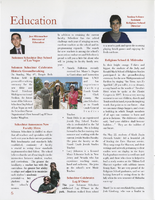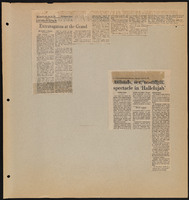Search the Special Collections and Archives Portal
Search Results

Meeting minutes for Consolidated Student Senate University of Nevada, Las Vegas, March 13, 1986
Date
Archival Collection
Description
Text

Meeting minutes for Consolidated Student Senate, University of Nevada, Las Vegas, April 29, 1980
Date
Archival Collection
Description
Text
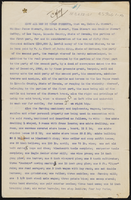
Stewart family real estate documents
Date
Archival Collection
Description
Stewart family real estate documents
Text
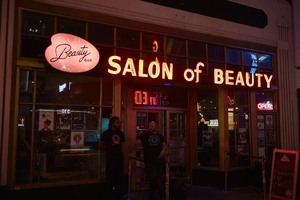
Photograph of Beauty Bar sign, Las Vegas (Nev.), June 28, 2017
Date
Archival Collection
Description
Site address: 517 Fremont St
Sign owner: Darin Feinstein and Corey Harrison (From Pawn Stars)
Sign details: Building originally constructed in 1988 for a retail store. The Beauty Bar franchise was founded in 2004 in New York City. The bar in Las Vegas used to be owned by Paul Devitt, but in 2014 is when Darin and Corey bought it and did some renovations. During the day they offer manicures/pedicures while serving cocktails, but at night function as a bar and concert venue with cool retro 1950s/60s salon style chairs and colors.
Sign condition: 3-4 During the day the sign looks faded and rusted over. At night the light does not beam as if it is a new sign either.
Sign form: Cabinet mounted to building
Sign-specific description: On the building there is a white oval shaped plastic sign saying Beauty Bar. Right above the doors there is a Salon of Beauty in channeled white block type letters. Both signs illuminate pink.
Sign - type of display: Neon and backlit sign
Sign - media: Steel and plastic
Sign - non-neon treatments: Backlit sign in plastic
Sign environment: Located in the Fremont Street East District surrounded by other bars and restaurants.
Sign - date of redesign/move: c. 2014
Sign - thematic influences: The bubbly pink backlit sign almost is the same shape as a painters pallet, so it shows an artsy theme since some consider doing hair and manicures as artwork as well
Sign - artistic significance: The "Salon of beauty" letters each have their illumination contained due to the metal channeling for each letter. The sign does have a retro aspect with their sign not looking totally brand new which extenuates the theme of an old beauty salon that you would see in the 50s or 60s.
Survey - research locations: Beauty Bar Website, accessor's office
Survey - research notes: Paul Devitt, the previous owner, actually started the chain of Beauty Bars in New York in 1995. He still has a part in the ownership in the other location he opened in N.Y., L.A., San Francisco and Chicago.
Surveyor: Emily Fellmer
Survey - date completed: 2017-08-14
Sign keywords: Backlit; Plastic; Steel; Neon; Fascia; Cabinet; Building-front design
Mixed Content
Kiel Family Photographs
Identifier
Abstract
The Kiel Family Photographs (approximately 1854-1989) contains glass plate negatives of members of the Kiel and George families, as well as neighbors from the Stewart and Wilson ranches and ranch workers. The majority of the photographs were taken at the Kiel Ranch site in North Las Vegas, Nevada. The collection consists of the original glass plate negatives, as well as photographic print and negative duplicates made using the originals.
Archival Collection
Richard B. Taylor Papers
Identifier
Abstract
The Richard B. Taylor Papers (1920-1993) document Richard Taylor's career and interests as a longtime Las Vegas, Nevada businessman and local historian, including his work as an executive at the Hacienda Hotel and Casino. The materials also include maps, development plans, and local publications for the Nevada communities of Laughlin and Mount Charleston, as well as publicity and promotional materials for these projects. As an amateur historian, Taylor also collected information on Las Vegas, Laughlin, and Mount Charleston.
Archival Collection
Alice Key Papers
Identifier
Abstract
The Alice Key Papers (1936-2004) consist of documents detailing Alice Key’s life and work in the African American community, historic preservation, and labor relations in Las Vegas, Nevada. Included in the collection are awards and certificates documenting Key’s achievements, invitations and programs to events, political and civic correspondence, and magazine and newspaper articles both about Key and written by her. The collection also contains photographs.
Archival Collection
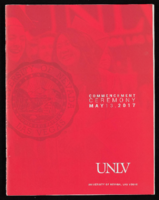
University of Nevada, Las Vegas (UNLV) Spring 2017 commencement program
Date
Archival Collection
Description
Commencement program from University of Nevada, Las Vegas Commencement Programs and Graduation Lists (UA-00115).
Text

